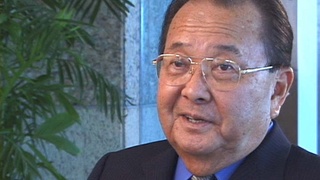Interviews
525 Quartermaster Corps
They formed what they called the 525 Quartermaster Corp and I guess they had a lot of other problem...troublemakers you might say from the Americans of German descents, Italian descents and people like us of the Japanese. So they put us into this unit called 525 Quartermaster Corp which…just to put us together and function was, just like I say, digging a whole and filling it up [laughs], a do nothing outfit. And then later on, I believe, they found out that we were good soldiers so…whenever they asked us an opinion we’ll give it but…we were obedient, we worked hard.
So, then they formed us 1800 General Service…Engineer General Service Battalion. And it was a legitimate engineering outfit. We had all the heavy equipment, build our own camps, do major bridge building and all that, so we had all those facilities. But all of us in there were ineligible for – we were all busted to privates when we got in there, and…but we were all given responsible positions, people were driving the tractors the…all the heavy equipment – as privates. And myself, I was on a pick and shovel for a while then they put me as acting supply sergeant and acting motor pool sergeant and then they put me as a company clerk, acting company clerk. So there I’m able to interact with all the officers daily, on a daily basis. They were very sympathetic to us and they knew our plight.
Date: March 25, 2005
Location: California, US
Interviewer: Sojin Kim
Contributed by: Watase Media Arts Center, Japanese American National Museum








